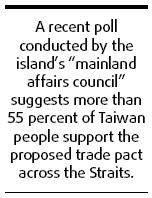Editorials
Stay true to what's good
(China Daily)
Updated: 2009-12-07 07:42
We shouldn't read too much into the results of Taiwan's local elections in terms of cross-Straits relations. The vote for county magistracies and mayoralties over the weekend is, after all, based mainly on the candidates' performance in handling local affairs rather than cross-Straits issues. But there is still a need to beware of its potential counteraction on cross-Straits ties, given the election's significance in shaping the island's internal politics.
The ruling Kuomintang (KMT) lost ground in the elections on Saturday, holding on to 12 of its 14 county magistracies, losing one to the opposition Democratic Progressive Party (DPP) and one to an independent. The DPP took 45.3 percent of the total votes, compared to 38.2 percent in the magisterial and mayoral polls four years ago. DPP Chairwoman Tsai Ing-wen said the results showed people were not happy with the government headed by KMT Chairman Ma Ying-jeou.

But Tsai and her pro-independence party, out of their anti-mainland mentality, are trying to misinterpret their victory as the islanders' disapproval of Ma's mainland-friendly policy. The DPP has been criticizing Ma of boosting economic ties with the mainland, and blamed his mainland policy for the island's economic woes. The groundless accusation, however, is nothing but a distortion of the truth.
Stronger economic and trade links across the Straits have brought huge benefits, not harm, to the island since Ma decided to lift the decades-old ban on direct trade, post and transport services with the mainland and opened Taiwan to tourists from the mainland. The mainland, as Taiwan's largest export market and largest source of trade surplus, has helped sharpen the island's competitiveness and prevented it from economic marginalization amid the global economic crisis.
A recent poll conducted by the island's "mainland affairs council" suggests more than 55 percent of Taiwan people support the proposed trade pact across the Straits.
Despite the election setback, it is hoped that the public support will boost the confidence of Ma and his KMT in sticking to their mainland policy for the island's long-term interests. While promising to improve the government's performance, Ma said on Saturday that he would "reflect on warnings sent by the elections".
It will be equally important for the leader to stay true to what is good for people's welfare. As Ma said before the elections, what he should mind is whether his policies can bring peace, prosperity and progress to Taiwan instead of the DPP's rhetoric.
The electoral gain may prompt the DPP to resort to a more radical approach toward sabotaging cross-Straits ties. Taipei and Beijing both should use wisdom and farsightedness to overcome the obstacles, especially when top envoys from both sides are scheduled to hold a new round of talks in the coming weeks.
(China Daily 12/07/2009 page4)














